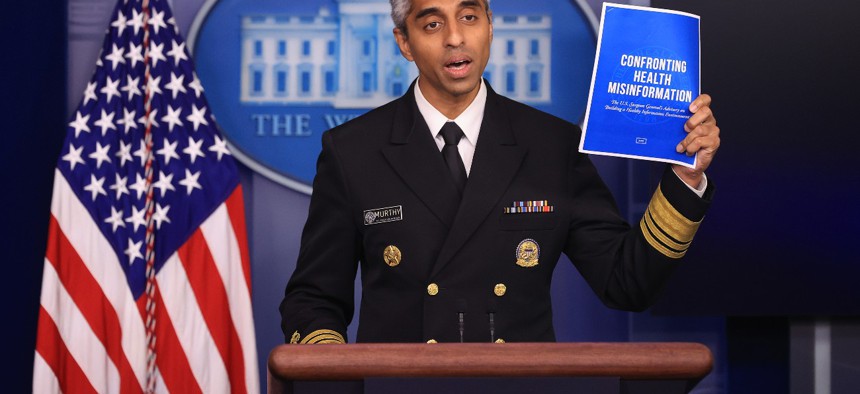
Chip Somodevilla/Getty Images
The Surgeon General Wants to Hear Your Experiences with COVID Misinformation
The White House’s new pandemic plan outlines efforts to buck falsehoods.
If you’ve been affected by misinformation during the COVD-19 pandemic, the U.S. Surgeon General wants to hear from you to help prepare for future public health emergencies.
“Health misinformation – health information that is false, inaccurate, or misleading according to the best available evidence at the time – has been a challenge during public health emergencies before, including persistent rumors about HIV/AIDS that have undermined efforts to reduce infection rates in the U.S. and during the Ebola epidemic,” according to a request for information from the Office of the Surgeon General that was published in the Federal Register on March 7.
“But the speed, scale, and sophistication with which misinformation has been spread during the COVID-19 pandemic has been unprecedented,” the request continued. “Recent research shows that most Americans believe or are unsure of at least one COVID-19 vaccine falsehood. The digital information environment is a phenomenon that requires further research and study to better prepare for future public health emergencies.”
Comments can be submitted until May 2. The Health and Human Services Department will review the use and applicability of responses and then share its learnings with the public.
Specifically, the government would like to know how COVID-19 misinformation affected health systems, infrastructure, patient care, healthcare worker morale and unproven treatments; how widespread this misinformation was on technology platforms; and the impact on communities.
“The inputs from stakeholders will help inform future pandemic response in the context of an evolving digital information environment,” said the request.
Surgeon General Dr. Vivek Murthy’s first surgeon general's advisory of the Biden administration, issued in July, was on the threat of health misinformation. More recently, the White House’s new pandemic preparedness plan has provisions on this.
HHS has taken the lead on initiatives to address vaccine misinformation and the administration overall has done public education and outreach campaigns to stop the transmission of misinformation, marshaled “trusted messengers at the community level” and increased research on thwarting misinformation, said the report. Now in the third year of the pandemic, which experts indicate is heading towards endemic, the Biden administration said it will continue these efforts as well as those for disinformation, which is false information that is intentionally deceptive.
Dr. Anthony Fauci, director of the National Institute of Allergy and Infectious Diseases and chief medical advisor to the president, told Government Executive in an interview last month that misinformation and disinformation are “the bane of our existence.”
On social media, “this disinformation and misinformation has really [had] an extraordinarily negative impact on what we want to do and I think the most important example of that is the mis- and dis-information associated with vaccination.”







